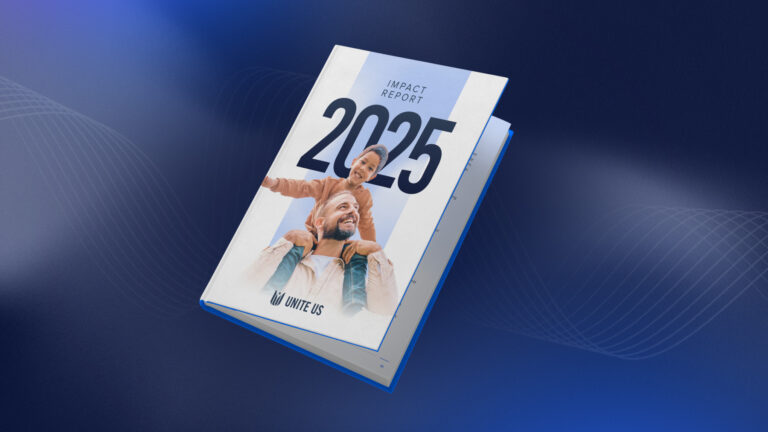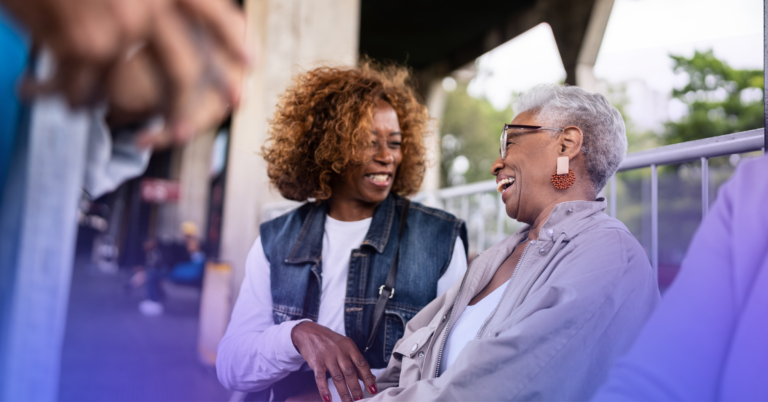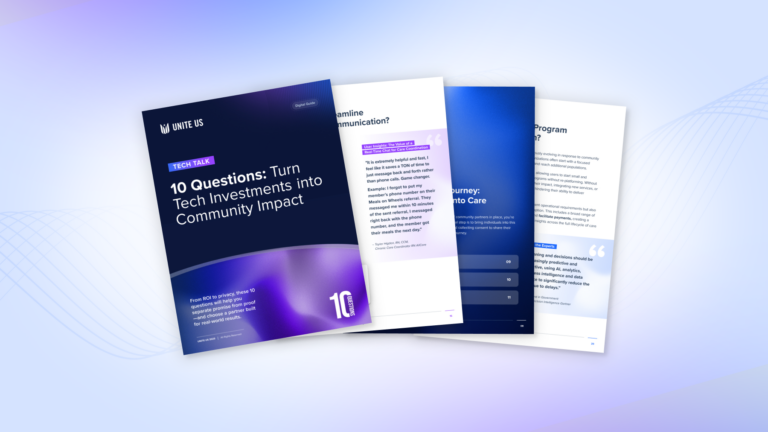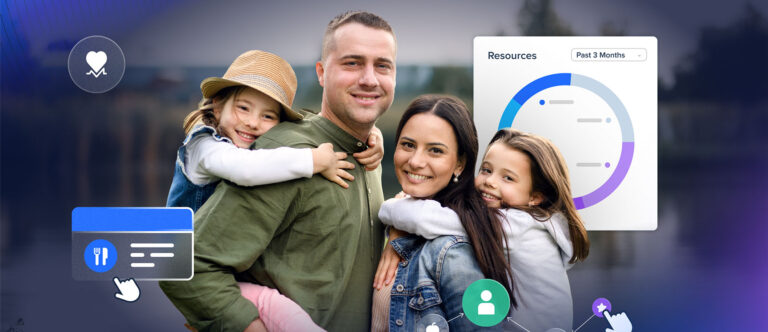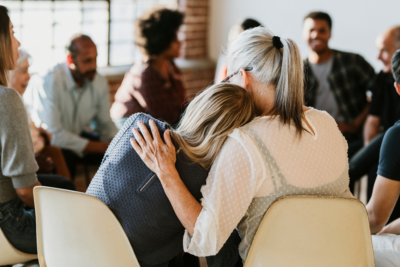
Strength in Numbers: Supporting IPV Survivors Through Community Partnerships
Exploring the role of coordinated care networks in supporting survivors of intimate partner violence (IPV).
October is Domestic Violence Awareness Month. To honor those affected by IPV and recognize those dedicated to helping them thrive, we welcome Michelle Gunn, Deputy Director at Leading into New Communities, Inc. (LINC). This North Carolina non-profit supports men and women returning from incarceration with transitional living and comprehensive case management services.
Michelle, a passionate advocate for IPV survivors, shares her experiences and explains how LINC makes a difference through community collaboration. Let’s learn from her valuable insights!
Intimate partner violence (IPV) often lurks in the shadows. This pressing issue not only affects individuals but also impacts our communities, intertwining with issues such as lack of access to housing, economic opportunities, education, and mental and physical health.
After nearly three decades in the social work and case management profession helping individuals in at-risk and marginalized communities, I’ve encountered countless survivors of domestic violence, sexual exploitation, and other forms of violence. IPV is alarmingly common, with the CDC reporting that about 41% of women and 26% of men experience contact sexual violence, physical violence, or stalking by an intimate partner. Among the women I have met who have been incarcerated, an estimated 90% to 95% have reported experiencing some form of physical or sexual abuse.
My commitment to addressing IPV stems from a desire to provide others with the same opportunities I was fortunate to receive—hope, support, and the chance to rebuild after trauma. Access to vital resources drives my efforts to guide individuals on their healing journeys.
What is Intimate Partner Violence?
Intimate partner violence is a form of interpersonal violence. Interpersonal violence involves the intentional use of physical force or power against other persons by an individual or small group of individuals and may be physical, sexual, or psychological.
Intimate partner violence is defined as behavior within an intimate relationship that causes physical, sexual, or psychological harm, including acts of physical aggression, sexual coercion, psychological abuse, and controlling behaviors. This includes violence by both current and former spouses and partners.
Domestic violence (which occurs between people sharing a household) is even more prevalent for women who are or have been incarcerated. The Safety and Justice Challenge estimates that 75% of women who have been or are incarcerated have experienced domestic violence.
When survivors of IPV become criminal defendants or are incarcerated, they still need access to full wrap-around services, including advocacy, support, safety planning, and community resources.
Empowering Change: The LINC Mission
At Leading Into New Communities, Inc. (LINC), we extend our support beyond IPV survivors in New Hanover County in North Carolina. Since 2000, we have served more than 2,600 previously justice-involved adults and youth, helping individuals reintegrate into the community, secure stable housing and employment, and contribute positively to our local economy.
Our holistic approach includes transitional living, vocational training, and case management, yielding an 85% success rate in helping individuals who were previously justice-involved secure stable employment, housing, and overall well-being—well above North Carolina’s average of 40% for similar programs. LINC also helps 100 to 150 adults annually through drop-in programs and referrals. By tackling the root causes of violence and providing essential support, we strive to create a safer, healthier community for all.
LINC’s journey highlights the challenges and successes of service organizations that support formerly justice-involved individuals, with IPV being one of the common issues we address. Our collaboration with Unite Us helps us streamline support services for survivors and highlights our commitment to empowerment and community impact.
Community-Specific Challenges and the Connection Between IPV and SDoH
The impact of social drivers of health (SDoH) on IPV is significant. Factors such as lower income, unemployment, and housing insecurity are closely linked to an increase in IPV. These aren’t just abstract concepts; they affect real lives.
For instance, the stress of financial instability and social isolation can lead individuals to feel trapped in abusive relationships, underscoring the need to address the environments we live in.
Rural communities often struggle with limited access to healthcare and social services, complicating reintegration for justice-involved individuals. In suburban areas, despite better resources, a lack of local programs and social isolation can hinder successful reentry. Urban communities face additional difficulties, as economic instability and high rates of violence create significant barriers for individuals trying to rebuild their lives.
LINC tailors its services to address these challenges, offering targeted support to improve outcomes for survivors and promote healthier communities.
Recognizing the Impact of IPV and Barriers to Leaving
IPV can show up as physical violence, emotional manipulation, sexual coercion, and economic control. Physical injuries are often the most visible signs, but not the only ones. A friend might withdraw from social gatherings, appear anxious, or express feelings of inadequacy and depression. Recognizing the signs is the first step to helping someone who could be suffering alone.
- Isolation: Withdrawing from friends and family.
- Behavioral changes: Noticeable mood shifts, such as increased anxiety or depression.
- Control: The partner exhibits controlling behaviors, dictating where the victim goes and whom they see.
When someone is experiencing IPV, barriers to leaving can feel insurmountable. Fear of retaliation is a significant concern, and the psychological toll can make it difficult for someone to leave a harmful relationship. Financial dependency also complicates matters. Many survivors lack jobs or safe places to go, making the leap into the unknown paralyzing. Societal considerations can further isolate them.
- Lack of resources: Survivors may not know where to find help or fear services won’t be available.
- Concern for children: Worries about children’s safety and well-being often weigh heavily.
- Cultural considerations: Pressure to maintain family unity or avoid negative perceptions can be significant.
The Importance of Privacy and Security in Collaboration
How can we, as a community, support IPV survivors? Collaboration is key.
Using Unite Us and the NCCARE360 network has made this possible for us at LINC. Through the Unite Us platform, we can connect IPV survivors with a network of support services, allowing them to access help without the burden of repeatedly reliving their trauma. The platform integrates providers, health plans, government agencies, and community organizations, creating an expansive care network that addresses the unique needs of each individual.
Just imagine how exhausting it is for a person who has experienced IPV to explain their situation over and over just to get the help they need. This streamlining of services not only improves the overall experience for IPV survivors but also ensures they receive timely support tailored to their specific circumstances.
Our collaboration with Unite Us allows LINC to continually refine our services and better support the community we serve. Confidentiality is crucial for organizations like ours that support IPV survivors. We must coordinate care while protecting clients’ privacy and building trust in the process. Our team relies on secure, user-friendly tools to ensure survivors get the support they need without the added trauma of repeatedly telling their stories. Unite Us provides this security, allowing us to streamline referrals and connect survivors to essential services—such as housing, counseling, and legal aid—while safeguarding their privacy.
This centralized approach not only meets their immediate needs but also fosters a more compassionate, trauma-informed system of care.
One Survivor’s Story
A single mother came to LINC for help after escaping an unsafe situation due to IPV. She was relocated with her kids, but soon after, violence in her new neighborhood put her family at risk again. She needed to move quickly while ensuring her children could stay in school.
Because of a coordinated effort involving LINC and partnering organizations, this mother was transferred to a safer location without disrupting her kids’ education. It is cases like this where it is critical that the platform used to document cases is secure. Other staff were able to support the family without her needing to retell her story, avoiding re-traumatization. The platform’s secure, closed-loop system guaranteed that sensitive information was shared exclusively with authorized staff, safeguarding her data throughout the process.
Today, she feels secure in her new home, with her children settled in school — a true reflection of how collaboration and streamlined, confidential services can transform lives.
Moving Forward Together
I am proud of all the community organizations like LINC across the country committed to supporting survivors. Many are often operating with limited resources, which affects the ability to provide comprehensive support. However, with the right tools in place, we can continue to scale our services and capacity to make a greater impact.
Each of us has a role to play in creating a community where survivors feel safe and supported. If you or someone you know is experiencing IPV, I urge you to reach out for help. There are resources available, and you don’t have to face this alone.
- National Domestic Violence Hotline: thehotline.org | 1-800-799-SAFE (7233)
Provides 24/7 support and resources for survivors of domestic violence. - RAINN (Rape, Abuse & Incest National Network): rainn.org | 1-800-656-HOPE (4673)
Offers support for survivors of sexual violence, including a national sexual assault hotline. - Love Is Respect: loveisrespect.org | 1-866-331-9474
Provides resources and support specifically for young people experiencing dating abuse.
Let’s come together as a community, inspired by personal stories and shared experiences. We can create a space where survivors feel heard, supported, and empowered to take the next step in their journey.
Author Bio
 Michelle Gunn is an accomplished leader with extensive experience in the nonprofit sector. Her work has centered on promoting individual and community resilience, advocating for marginalized populations, and championing person-centered care. Her dedication to social justice and community well-being is reflected in her leadership roles, which include serving as a former member of the QENO Advisory Council and the New Hanover County Health and Human Services Board. She is currently a board member of the TIDES program, further demonstrating her commitment to improving lives through innovative and compassionate service.
Michelle Gunn is an accomplished leader with extensive experience in the nonprofit sector. Her work has centered on promoting individual and community resilience, advocating for marginalized populations, and championing person-centered care. Her dedication to social justice and community well-being is reflected in her leadership roles, which include serving as a former member of the QENO Advisory Council and the New Hanover County Health and Human Services Board. She is currently a board member of the TIDES program, further demonstrating her commitment to improving lives through innovative and compassionate service.
A graduate of the University of North Carolina Wilmington, Michelle holds a Bachelor of Arts in Sociology with a minor in Psychology. She is currently pursuing her Master’s Degree in Justice Involved Care from Morehouse School of Medicine, a program she will complete in December 2024. This further highlights her dedication to understanding and addressing the complex challenges faced by justice-involved individuals, with a focus on holistic care and systemic change.
Michelle’s expertise has positioned her as a thought leader and advocate in the fields of justice-involved care, trauma-informed practices, and community-based resilience. Michelle is passionate about leveraging her knowledge and skills to drive meaningful change, improve access to resources, and create environments where all individuals, especially those with a history of trauma or incarceration, can thrive.
